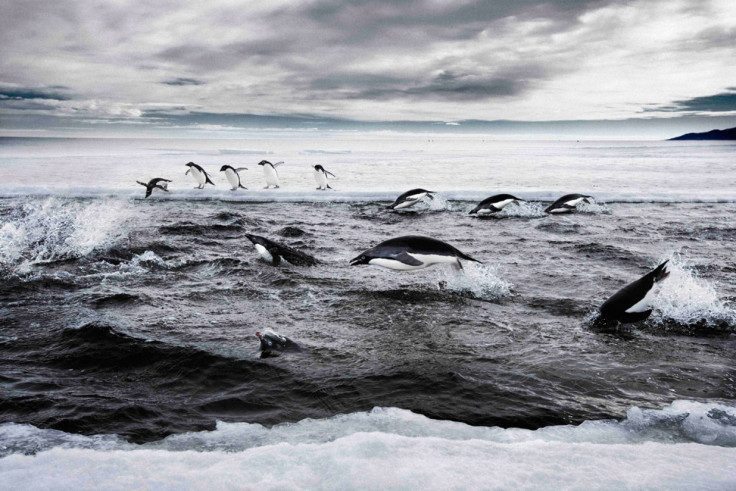Massive Antarctic Sanctuaries That Would Have Doubled World’s Protected Oceans Blocked By Russia

It was an ambitious plan that galvanized the international conservation movement and would have doubled the amount of protected area in the world’s oceans, but after unsuccessful meetings in the German seaport of Bremerhaven this week, it remains just that: an ambitious plan.
Scientists and politicians from 24 nations and the European Union gathered for an “unprecedented” meeting under the Commission for the Conservation of Antarctic Marine Living Resources, or Ccamlr, to discuss two enormous Antarctic marine protected areas, or MPAs, each of which would be the world’s largest. Yet, as in the first meeting last October, their talks failed to reach a required unanimous agreement.
“All members, except Russia, came to this meeting to negotiate in good faith,” lamented Steve Campbell, campaign director of the Antarctic Ocean Alliance, a coalition of more than 30 environmental organizations, and one of the main driving forces behind establishing the world’s largest network of marine reserves and protected areas around Antarctica. “After two years of preparation, including this meeting, which Russia requested to settle the scientific case for the Ross Sea and East Antarctic proposals, we leave with nothing.”
The Russian delegation, with support from the Ukrainians, raised legal issues during the meetings as to whether Ccamlr had the authority to establish MPAs in the first place, despite the fact that the organization established its first high-seas MPA around the South Orkney Islands four years ago.
“The actions of the Russian delegation have stalled progress on protecting the Ross Sea and East Antarctica, and have put international cooperation and goodwill at risk, two key ingredients needed for global marine conservation,” said Andrea Kavanagh at the Pew Charitable Trusts, which fought for the MPA under its Southern Ocean campaign. “It is imperative that countries send their representatives back to the table in Hobart (Tasmania) three months from now to find consensus to protect marine life in Antarctic waters and safeguard some of the most pristine ocean areas on Earth.”
The Ross Sea MPA proposal, from New Zealand and the U.S., and the East Antarctica MPA proposal, put forth by Australia, France and the European Union, would each cover about 600,000 square miles (1.6 million square kilometers) of water around Antarctica. Scientists say this stretch of sea, roughly the size of India, represents the most intact ocean ecosystem left on earth, with more than 10,000 unique species, including most of the world’s penguins, whales, seabirds, colossal squid and Antarctic toothfish (also known as “Chilean sea bass”). Its conservation, however, has tested international willingness to restrict commercial activity in the high seas.
The Ross Sea proposal would ban fishing and create a special “research zone,” where scientists could monitor the effects of climate change on the ecosystem, along with the success of the MPA. The East Antarctica proposal, meanwhile, would also ban fishing and safeguard wildlife like penguins and krill.
Scientists say these two areas are vitally important as they support an estimated three-quarters of all marine life. A 2004 Princeton University study found that the nutrient-rich waters from the deep ocean are pulled to the surface by a single ocean-circulation pattern in the Southern Ocean and then distributed around the world.
Meanwhile, the U.N. Food and Agriculture Organization reports that over the past 40 years, the global percentage of fish stocks in crisis has risen sharply, with some 85 percent fully exploited, overexploited, depleted or recovering from depletion. As a result, many fishing fleets are looking south because stocks closer to home have been exhausted.
“All of the world’s oceans -- including those around Antarctica -- are under increasing pressure that makes the protection of near-pristine areas such as the Ross Sea and East Antarctica ever more urgent,” said Richard Page, Greenpeace Oceans campaigner. “Considerable effort and some rigorous scientific work have been put in by many Ccamlr members to get this far. The Russian delegation must now work in good faith and make sure the proposals go forward at the next Ccamlr meeting to ensure a lasting legacy for future generations.”
Actor Leonardo DiCaprio penned an essay for the Russian newspaper Rossiyskaya Gazeta earlier this week, while “Avatar” director James Cameron and Virgin chief Richard Branson issued an open letter to President Vladimir Putin urging Russia to help protect the waters off Antarctica. But the Russian delegation did not budge.
Blair Palese of the Antarctic Ocean Alliance said Russia is notoriously difficult to influence politically. “We will keep trying both from a political and public pressure point of view,” she said. “Obviously, more important is for the proponent countries who support the MPAs to double their efforts to see why Russia has so strongly opposed this and how to overcome their objections. There is much work to be done.”
Founded in 1982 to protect Antarctic marine life, Ccamlr’s 24 members include the European Union, Australia, Brazil, China, Russia and the United States. The organization will meet again at its headquarters in Hobart, Tasmania, in three month’s time to the debate the two MPAs yet again.
© Copyright IBTimes 2025. All rights reserved.






















